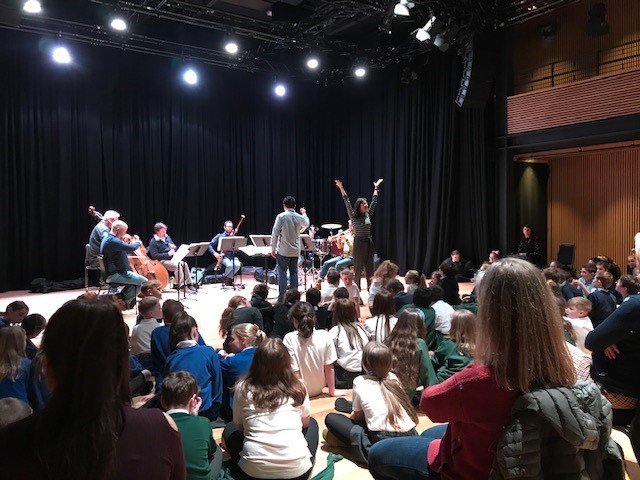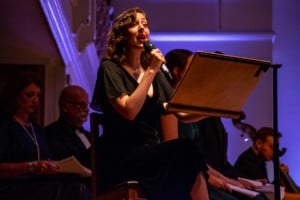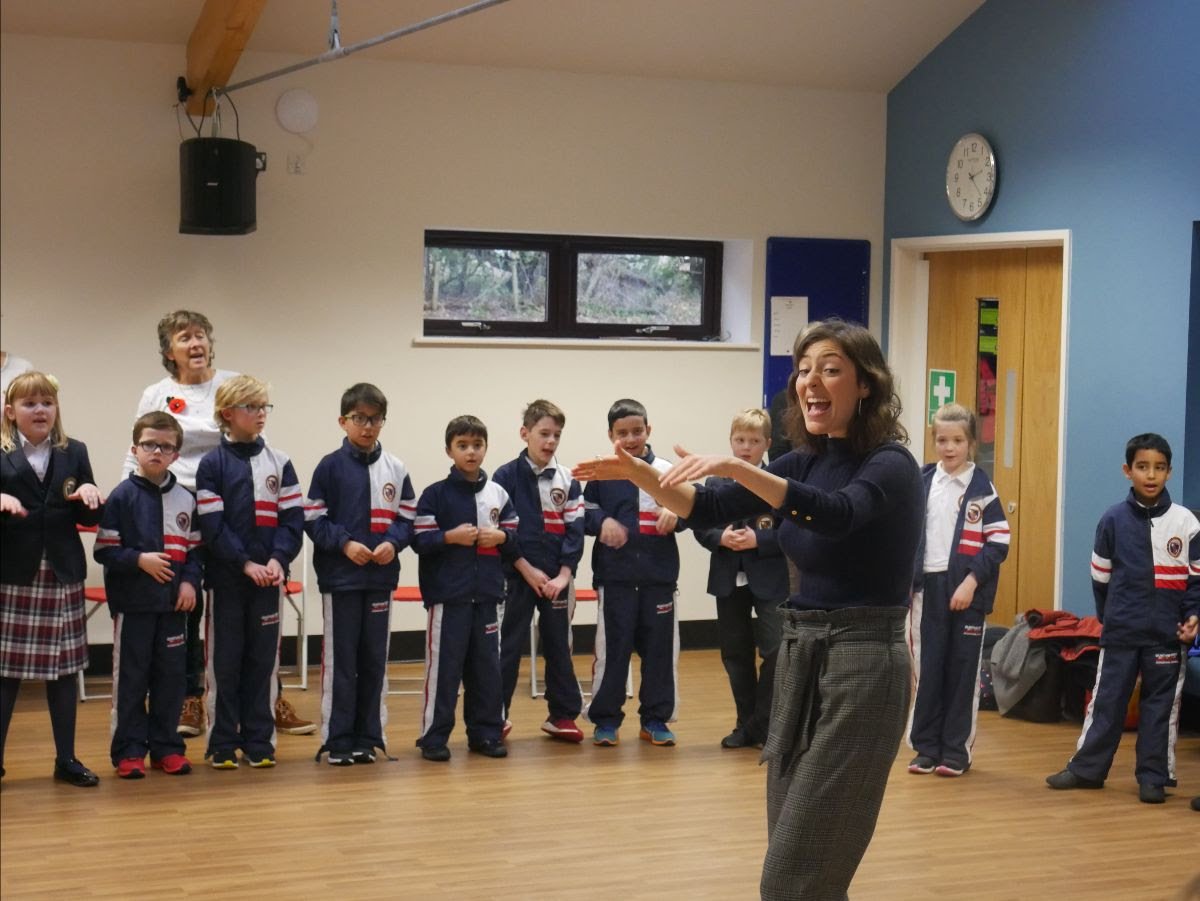Alumni spotlight: In conversation with Lucy Drever
Wed 20 May 2020Workshop leader and presenter Lucy Drever graduated from Trinity Laban with a BMus (Hons) in Vocal Studies in 2013.
Over the last seven years she’s carved out a successful career in music education, working with various arts organisations including Wigmore Hall, Philharmonia Orchestra and the Benedetti Foundation. She works in a variety of settings including early years spaces, schools, arts venues, hospitals, care homes and prisons.
Recently Lucy was announced as an Associate Artist of the BBC Scottish Symphony Orchestra (BBC SSO).
We caught up with her to find out more.
You’ve worked with BBC SSO since October 2018. What does this involve?
“Over the last 18 months I’ve worked with the BBC SSO on various projects in Scotland, including residencies in Campbletown and Holyrood Secondary School.
“I’ve also been involved with Connecting the Dots, which is an opportunity for local settings to get in touch with BBC and connect with one of the BBC Orchestras or Choirs for online workshops. I led a training for 100 professional BBC musicians on how to lead workshops.
In orchestras I think education work has been proven to be really beneficial for the musicians themselves as well as the communities they’re working with.”

You are now the first ever Associate Artist in Music Education for BBCSSO. How did this role come about and what will it entail?
“The BBC SSO are committed to making education work as important as the artistic side of what they do, so that’s really how the role came about.
“The role is for at least three years, which will give us a really good chunk of time to actually build some meaningful work developing accessible and inclusive music in communities and with partners.
“As far as we’re aware it’s one of the first purely educational Associate Artistic roles of any orchestra, certainly on this scale. I’m interested to see how it will affect the wider orchestral landscape in terms of education work. I think it’s come at the right time. I cannot believe it. I’m really lucky.
“I think a large part of it will be quite responsive to what the orchestral musicians think up and the conversations that we have. There are definitely areas of work that we know already that we want to develop. For instance, we want to take Tunes for Tots around Scotland and possibly think about some form of online presence.
“I personally would love to do more relaxed concerts although I’m not quite sure yet who for, whether it’s for everyone or we have a focus. And then building relationships with music organisations predominately in Glasgow who are already doing amazing work.
I think what I’m probably most excited for in this role is making the orchestra fit for everybody else, rather than everybody having to fit in with the orchestra.”
How did you become interested in education work?
“At school we always had the opportunities to lead choirs and stuff. I really enjoyed it. Then when I left school I did care work, so I had this kind of interest in working with the more vulnerable groups in the community.
“When I was studying at Trinity Laban, an opportunity came up to work with the Learning and Participation Department assisting with a choir for older adults.
“I was really reluctant to go into this world, quite frankly, because I thought education meant either working full time in a school or peripatetic teaching which I’m rubbish at.
It was really the staff at Trinity Laban who saw something in me before I did. They took me on and gave me every opportunity.”
“Andrea Spain [Assistant Director of Music and Head of Learning & Participation at Trinity Laban until 2017] encouraged me to apply for the Trainee Music Leader scheme at Wigmore Hall. For 11 months I got to work across their learning programme, observing and leading workshops, and I received funding to go to Orkney to do a vocal course.”

What were the most valuable things you learned during your time at Trinity Laban?
“I never wanted to be a singer, but I do use my voice a lot, and I’m grateful for my classical training as it’s given me good vocal stamina and a solid technique.
“I still get nervous but not irrationally so. I believe that’s because I have a vocal degree, which was the hardest thing I’ve done in my entire life. If you can get through four years of that you can do anything.
“For my audition we had to do an improvised piece. I think that symbolises what Trinity Laban is about. They’re interested in individuals’ creativity.
“And also, from day one, this term of portfolio career was introduced. We were given permission to do a bit of everything. If you look at Trinity Laban musicians, they’re all quite flexible and are interested in collaboration and in other genres.
“CoLab was the most wonderful introduction to collaboration between different genres and art forms. I learned so much, including how to be respectful of everyone’s craft.
I really owe Trinity Laban everything. They introduced me to this world of music education that I didn’t know was a thing.”
What are some of the highlights of your career so far?
“I’m really proud that I worked with Music in Prisons. Their Artistic Director Sara Lee is a great mentor to me. I’ve learnt so much from her about respect in a room. Those projects have really been highlights of my career.
“Something that was quite big for me was that in 2016 or 2017 I became fully freelance. I never thought that I would do that, and that was massive for me, making my own career.
“I’ve been so lucky to work with so many orchestras and groups. I presented the Philharmonia’s first even family concerts. That was hugely emotional and wonderful. And to have this role with BBC SSO is just crazy – it’s a total honour.
“I’m quite surprised I work with orchestras. I was brought up listening to vocal music and because I don’t play an instrument to that level, my way in is through the story the music tells. I think that should be the way in for any audience. I think that’s why I’m getting this work because I’m quite good at communicating about it. I’m so thankful that I’ve been so accepted into this world.”
What is it like working in a variety of non-traditional settings?
“It’s the biggest privilege. I was doing some workshop in children’s hospices at the beginning of the year. To be allowed that time is a massive honour. Music let’s you connect on a deep level. To have that vulnerability in what’s already a scary situation is a privilege. I love working with such brave people. We could learn a lot from that.
I quite like feeling uncomfortable, not quite knowing what’s going happen. I just love the challenge. I love having a plan and then throwing it away. That’s where I’m happiest.”
“I’ve worked really hard on not becoming ‘known’ for one thing. My personality is such that I have to be doing everything. The things you learn in prisons, you can use for under fives. It all just really informs each other.
“So much of my work is making people feel safe – not just the participants but the musicians as well. My job is holding a safe space where people can share ideas. With what I do, everyone is equal. It’s about the collaboration between the different voices in the room – musicians, participants, me – rather than one of us giving something to someone else.”

Can you share any advice for students who might be aspiring to a similar career path?
“Observe workshop leaders and workshops in different settings. You need to have experience, so it’s about getting yourself in the room and engaging. You also need to be patient.
“I spend a large part of my career having conversations with people. People have to know who you are and the kind of things you can do because then they can suggest opportunities to you that you’ve never even heard of.”
Any future plans you’d like to share with us?
“From 11 May the Benedetti Foundation are leading tutorials online for people all over the world. We’ve already had 200 people sign up in the space of about 2 hours. I’ll be doing more work with them in their general musicianship team.
“I’m also one of Wigmore Hall’s Early Years Leaders. I lead on their Chamber Tots project and a project with a partner school.
“I’ll be narrating The Secret Garden in November at the Adelphi Theatre for Lambert Jackson Productions. I’m so nervous! I’ve always done narrating and storytelling on the side, and this opportunity came about through presenting some musical theatre concerts. Then the production company asked me to narrate their concert version of Dr Zhivago last year at Wigmore Hall.
I love the whole presenting side but I really don’t see it as performing. I see myself as the middle woman between the audience and the orchestra.”
–
Find out more about Music Education at Trinity Laban on our study pages.
Discover more about studying voice on our vocal page.
–
Main Image: Lucy Drever (credit Colm Ó Braoin)
